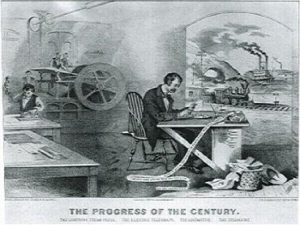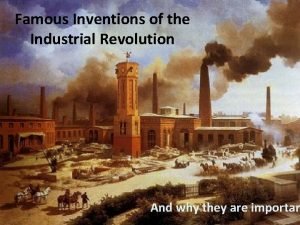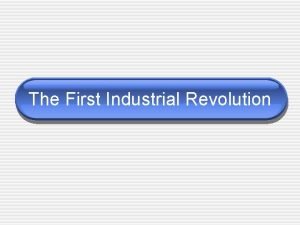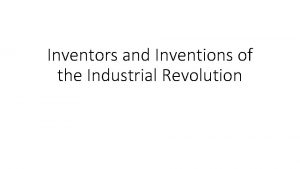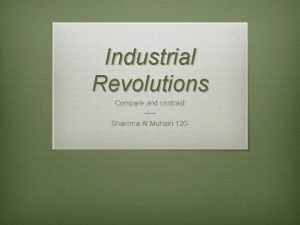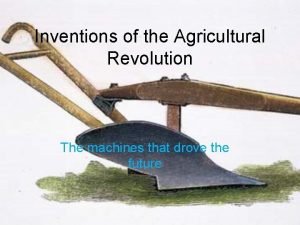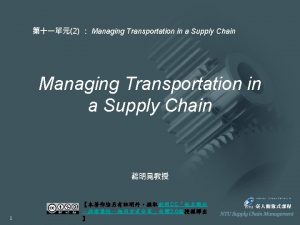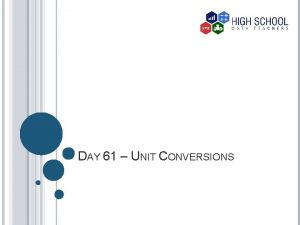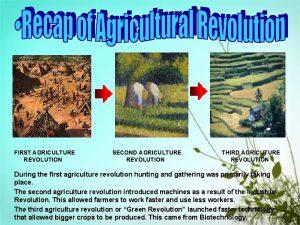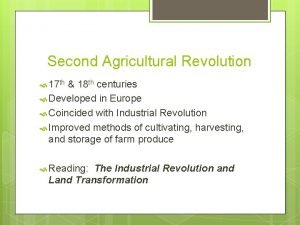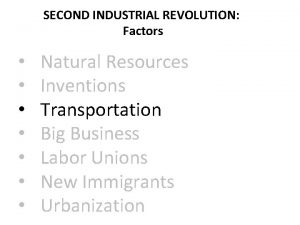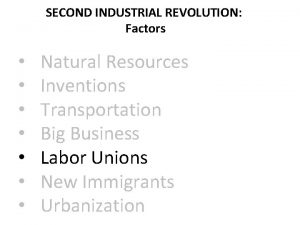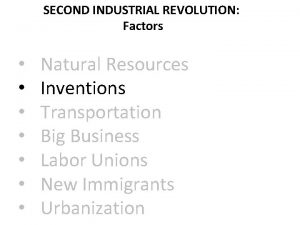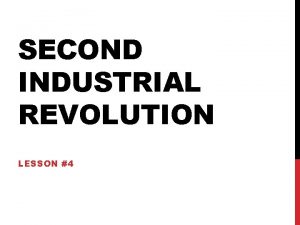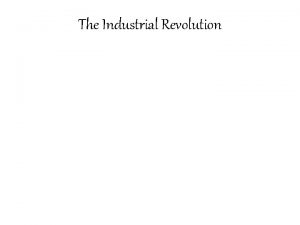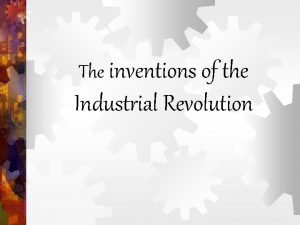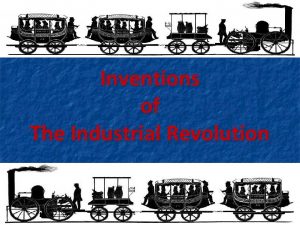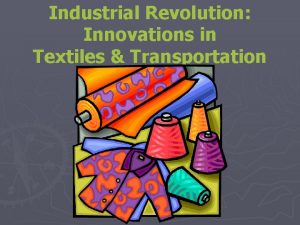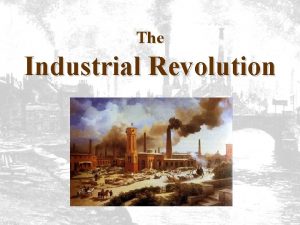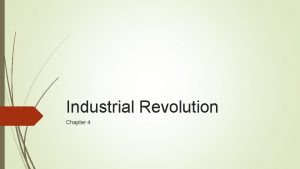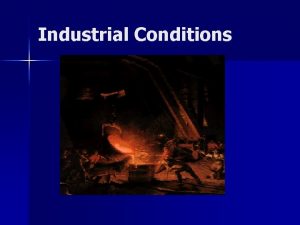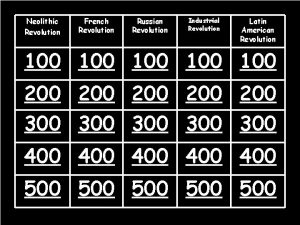SECOND INDUSTRIAL REVOLUTION Factors Natural Resources Inventions Transportation

















- Slides: 17

SECOND INDUSTRIAL REVOLUTION: Factors • • Natural Resources Inventions Transportation Big Business Labor Unions New Immigrants Urbanization

The Industrial Revolution Previously On: • We looked at how the Transcontinental Railroad helped the economy and society in the US Today On: • We are going to look the “captains of industry” in the United States and how these men controlled America. These new industries resulted in the growth of “big business” Why It Matters Now: • Many of the strategies used today in industry have their origins during the Industrial Revolution

SECOND INDUSTRIAL REVOLUTION: Big Business • Robber Baron: derogatory name used for powerful 19 th C businessmen viewed as having used questionable practices to get their wealth • Questionable Practices: Lie, cheat, steal, manipulate prices, buy out others, etc.

SECOND INDUSTRIAL REVOLUTION: Big Business • The economic climate of the U. S. during this time was ripe for ambitions individuals to build huge companies and make huge fortunes • The business world welcomed new entrepreneurs willing to take risks for a reward in profit • The idea was that a strong work ethic could make someone successful and better themselves by their own efforts • This view of entrepreneurship grew out of our economic system of capitalism called “free enterprise”

SECOND INDUSTRIAL REVOLUTION: Big Business • In our economy, individuals run most industries (Henry Ford, Bill Gates, Steve Jobs, Sam Walton, etc. ) • They are allowed to set their own prices and wages • The business leaders of the I. R. believed in “laissezfaire” (les-a-fair) capitalism-means “hands-off” • This allows businesses to work without intervention by the government • Business leaders believed govt regulation would destroy self-belief, reduce profits and hurt the economy • They wanted the govt to STAY AWAY!

SECOND INDUSTRIAL REVOLUTION: Big Business • Because of no govt intervention, not everyone was equal • Some people became very rich while others were very poor • Business leaders embraced the idea of “Social Darwinism”-only the strong survive! • Stronger people and businesses would prosper • Weaker ones would fail • Leaders believed in “laissez-faire” and that govt shouldn’t regulate the market

SECOND INDUSTRIAL REVOLUTION: Big Business • A few individuals, “big business”, dominated the economy with factories, warehouses, offices and distribution facilities they owned • They did all they could to gain dominance and to: • Maximize profits • Rid competition • Control production

SECOND INDUSTRIAL REVOLUTION: Big Business • Vertical Integration-to control industry, bought out their suppliers • Ex-Andrew Carnegie bought coal fields, iron mines, ore ships, and railroad lines to control every part of his industry • Horizontal Integration-a process that joints together companies producing similar products • Sometimes called a “merger” • Bought out stock of these companies, now controlled them

SECOND INDUSTRIAL REVOLUTION: Big Business These business owners very successful because they could: • offer products at very low prices • paid workers very poorly • bought out competitors Also because big corporations could: • • produce more goods cheaper and better Cut prices lower than others Get better deals by buying in bulk Small businesses couldn’t compete, would shut down

SECOND INDUSTRIAL REVOLUTION: Big Business Andrew Carnegie • • • Steel industry 2 nd richest American Made $ investing in companies that served RR companies Bought shares in steel mills, train factories to control as much steel as he could Bought out suppliers and companies producing goods for him (coal mines, iron mines, freighters, railroad lines) to control materials

SECOND INDUSTRIAL REVOLUTION: Big Business John D. Rockefeller • Oil industry • Standard Oil Company controlled 90% of oil in the US • Paid workers very low wages • Drove off competitors by selling oil at lower prices that it costs to produce it

SECOND INDUSTRIAL REVOLUTION: Big Business JP Morgan • • Banker Bailed out the US economy with a loan of 62 m dollars of his own money One of the cleverest and most innovative bankers in the world Made fortune buying and selling stocks

SECOND INDUSTRIAL REVOLUTION: Big Business Cornelius Vanderbilt Shipping & railroads Became the largest steamship operator in the U. S. Creates the largest shipping empire in the world He sells nearly everything to invest in the new railways believing they’ll unite America • By war’s end, he’s the richest man in America with a net worth of over $65 million equivalent to nearly $75 billion today from railroads • •

SECOND INDUSTRIAL REVOLUTION: Big Business • Carnegie gains control of his suppliers and controls almost entire steel industry • J. P. Morgan takes over and merges the railroad, steel and farm equipment industries • Rockefeller gains total control of oil industry in America • All three achieved a complete monopoly, or complete control over an industries production, wages and prices • These monopolies meant buyers had fewer choices in the marketplace • Without any competition, these companies could charge whatever price they wanted • Buyers would have to pay the price because they couldn’t get the product anywhere else

SECOND INDUSTRIAL REVOLUTION: Big Business • Alarmed at the tactics of industrialists, critics began to call them “robber barons” • But many industrialists were also philanthropists, or people that gave their money away. • Although Rockefeller kept most of his assets, he still gave away over $500 m, establishing the Rockefeller Foundation, providing funds to found the University of Chicago, and creating a medical institute that helped find a cure for yellow fever. • Andrew Carnegie donated about 90 percent of the wealth he accumulated during his lifetime; his fortune still supports the arts and learning today. “It will be a great mistake for the community to shoot the millionaires, ” he said, “for they are the bees that make the most honey, and contribute most to the hive even after they have gorged themselves full.

SECOND INDUSTRIAL REVOLUTION: Big Business • Many business leaders earned their fortunes through unfair business practices • These criticisms grew stronger in the 1880 s as corporations became more powerful • Some people became concerned when a company became a “monopoly”, or total ownership of a product or service • Carnegie-Steel Rockefeller-Oil • Many citizens and small businesses wanted the govt to help control monopolies

SECOND INDUSTRIAL REVOLUTION: Big Business • In July 1890 Congress passed the Sherman Antitrust Act, a law that made it illegal to create monopolies or trusts that crushed competition • It stated that any “attempt to monopolize. . . any part of business among several states” was a crime. • However the antitrust laws were therefore difficult to enforce • Corporations kept growing in size and power
 Industrial revolution natural resources
Industrial revolution natural resources Famous inventions of the industrial revolution
Famous inventions of the industrial revolution Francis cabot lowell invention
Francis cabot lowell invention Bessemer process
Bessemer process The second industrial revolution timeline
The second industrial revolution timeline Shamma al muhairi
Shamma al muhairi Agricultural revolution inventions
Agricultural revolution inventions Scientific revolution inventions
Scientific revolution inventions Factors affecting transportation cost
Factors affecting transportation cost 186 282 miles per second into meters per second
186 282 miles per second into meters per second Agricuture jobs
Agricuture jobs 1 hectare size
1 hectare size Redlining ap human geography
Redlining ap human geography The second agricultural revolution coincided with
The second agricultural revolution coincided with Urban hearth regions
Urban hearth regions Russian revolution vs french revolution
Russian revolution vs french revolution You should hope that this game will be over soon
You should hope that this game will be over soon Third agricultural revolution definition
Third agricultural revolution definition
